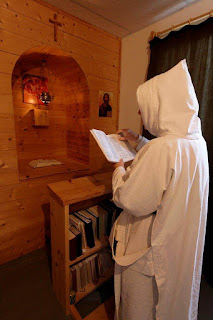The one dimension Ivers brings out which I had not spelled out explicitly myself is the temporary nature of a laura. (I realize much of what I have written necessarily implies this but Therese is definitely a step (or three!) ahead of me here. Regarding the diocese's responsibility in formation, both initial and ongoing, Ivers and I are also in essential agreement; I believe, however, we may differ on the way this responsibility is exercised. Meanwhile, I very much appreciate the various comments she has made on candidates for profession, discernment, formation, the desert fathers and Mothers, and so forth. Please note, I do add one element to the lists of distinguishing qualities Ivers supplied below, namely, spirituality; the approach to diverse spiritualities differs significantly from laura to community. The one thread that runs throughout Iver's analysis is the significance and uniqueness of the c 603 vocation. Emphasis on formation, discernment, the continuing role of the bishop, and the individual nature of the vocation are dimensions of this extraordinary significance. My sincerest thanks to Therese for sharing her work and time in this!
“Go, sit in your cell, and your cell will teach you everything!”In the early centuries of the Church, men and women fled to the desert as the Church’s first hermits. Christianity had become the official religion of the empire, and as a result of external prosperity and growth, Christian praxis became lax in the cities. Virgins, hermits, and ascetics grew in numbers to fill the vacuum of those intent on a life devoted to the sole focus on the service of Christ in a life of perfect chastity lived in the manner of their respective calling.
It should be noted that these were hard-core practicing Catholics who were familiar with their faith and extremely familiar with those things “in the world” that could distract them from their focus. In today’s language, we would say that these men and women were “well catechized” or “well formed”.
Hermits were no exception to the general quality of being “well catechized”. Nevertheless, not all were prepared for life in the desert or to the specific challenges of their calling. As a result, “mentors” naturally arose when hermits of great fame for holiness began to accept followers in their lifestyle. Likewise, hermits began to gather together at times for communal exercises albeit infrequently. How else would we know the doings of various hermits through the sayings of the Hermit fathers and mothers?
Today, we have two forms of individual consecrated life in the Latin Church. One is that of hermits (canon 603) and the other, the portion of the order of virgins (canon 604) who are not also members of a religious institute. There are many myths about both forms of life, which have arisen for many reasons, particularly because of a profound misunderstanding of the nature of the vocation to be a hermit or to be a spouse of Christ respectively. The purpose of this article is to discuss some aspects of the eremitic vocation that is not always clear to those who are not cognizant of this vocation.
Individual Life Lived “In the Silence of Solitude” is the Primary Reality or Framework Designated by Canon. 603
As some people are aware, my original proposal for my doctoral dissertation in canon law was centered on the “Silence of Solitude” aspect of canon 603. It encapsulates the solitary lifestyle which is permeated with the mental and physical silence required for the “desert” substitution which provides the backdrop of the intense grappling of the soul with itself and heavenly -and not so heavenly- things.
Solitude, or a “stricter withdrawal from the world” is not a mere metaphor. It requires a similitude to the desert in which an individual is not rubbing shoulders with people on a daily basis [with the exception, perhaps of attendance at daily Mass if this is called for in the hermit’s rule]. Encounters with people should be infrequent, even in the running of a guest house, which should have periods of unoccupancy to facilitate the solitude of the hermit manager.
This is not a “religious of one” paradigm in which a hermit is free to do apostolic activity willy-nilly. On the contrary, the lay hermit (or diocesan hermit) is expected to be extremely withdrawn from the everyday hustle and bustle of the world. This includes apostolic works.
Some individuals imagine that they can live as a “caretaker” for someone else and live authentically as a hermit. Again, this is simply not the case. Caring for another person on a daily or frequent basis goes against the solitary nature of this vocation. But it is compatible for reasons of age or illness for the lay or diocesan hermit to be cared for, as there is a profound difference between caring for another in their daily necessities and being cared for in daily necessities when one is unable to do so.
The implication for a “laura” is also clear. That it is not the responsibility of individual hermits living in a laura (inside their individual hermitages) to administrate long-term care for an elderly or chronically ill fellow-hermit, and that provisions must have already been made and executed for the long term care of such hermits in appropriate facilities or with relatives [ideally Catholic].
Although it is possible for diocesan hermits to gather together in a geographic place, a laura is intended to be strictly distinct from a religious eremitic or semi-eremitic institute. Here are some of the key differences: (Apologies to Therese Ivers, because here she has a great chart laid out side by side; I couldn't use that here (space limitations) so I have set these two sets of characteristics out sequentially.)
Religious Institute:
- Common Superior to whom obedience is vowed who is not the bishop
- Common purse; the institute is jointly responsible for the wellbeing of the religious from the day of entrance until their deaths.
- Common rule of life
- Meals in common. Meals are eaten together in a refectory or at the same time in the hermitage.
- Communal Office or synchronized hours designated at common times [e.g. the horarium is the same for every individual even if the office is said alone in the hermitage such as in a Carthusian charterhouse]
- [In addition I would add here the single spirituality which characterizes an Institute and in which members are formed. An Institute of Consecrated Life will serve as a paradigm of a particular spirituality and its founder/foundress; it stands within the living tradition of this particular current of spirituality and consciously reflects and extends it. Thus a community will be Franciscan or Carmelite, or Camaldolese, and so forth. (SLO'N)]
- Obedience directly to the bishop as superior is professed
- Each individual hermit has their own bank account, retirement funds, health care and other insurances, and is expected to manage their finances individually. The individual hermit is expected to be independent regardless of whether they stay in a laura all their life, leave of their own accord, or are asked to leave.
- Individual rule of life that has been lived outside of the laura and which will be observed before, during [and even after] life in a laura.
- Generally meals should be taken alone and within the cell even if cooked for the whole laura. What is eaten, how it is eaten, and when it is eaten will be autonomously decided by the individual hermit.
- The individual hermit recites the liturgical hours or other prayers [non-cleric hermits are not obligated to say the liturgy of the hours and may in fact choose other forms of prayer to occupy their time] within the hermitage. This prayer-cycle is individualized for the growth of the hermit and therefore is highly unlikely to be synchronized with other hermits.
- [In addition to Therese Iver's list I would add here that there is no single spirituality beyond the general desert spirituality of the solitary hermit. A laura does not inculcate, much less form persons in a single spirituality like Franciscan, Camaldolese, Carmelite, etc. Instead it welcomes a diversity of spiritualities which will exist in harmony within a desert framework marked by the charity (in both rigor and flexibility) of the Desert Ammas and Abbas. Since a laura as such does not engage in the initial formation of hermits, and since it is a second half of life vocation, there is no concern with forming novices in a particular spirituality. (SLO'N)]
Canon 603 is not intended to encourage the formation of lauras, but is primarily focused on the actual solitary vocation for which membership in a laura may be a help or a hindrance. In any and all events, membership in a laura cannot be a condition for profession as a hermit and it must always be the result of a voluntary and seriously discerned path on the part of the experienced and [ideally] already professed hermit who believes it may be of benefit.
Unfortunately, due to greater familiarity with religious institutes, dioceses may have an incorrect understanding of the difference between a laura and a budding religious institute. This may cause abuses of canon 603 when a “hermit” is really an aspiring founder/ess of an eremitical or semi-eremitical religious institute. If the “hermit” really intends to be a religious founder, then the steps for the founding of a religious institute are to be utilized and the “vocation” tested.
As a canonist, I have heard all too often the opinion that the “ideal” hermit is one who has membership in a laura. To the contrary, I would say that membership in a laura by its very nature would merely be a temporary living situation for a diocesan hermit. The diocesan hermit cannot escape the hard work of crafting a personal rule of life over the course of several years – I consider the minimum for this to be at least 7-9 years as a prudential measure not unlike the requirement for final profession of contemplatives to have had no less than 9 years of formation reasonable. [Emphasis added to original]
This rule of life cannot be a mere appropriation or light tinkering of existing rule(s) of religious institutes or even that of other hermits. It must result from experimentation and the self-knowledge of what is helpful for this particular person in his/her struggles in “the desert”. This hermit must know what a balanced lifestyle for himself looks like and that will not be identical to that of anyone else.
The relationship between the hermit and his/her bishop is a direct one, as the bishop is the lawful superior of the diocesan hermit. This remains true even in a laura, as the position of hermits in a laura is that of equals among equals. Any “leadership” position would be only to assist with certain communal exigencies of living on the same property; real authority is not canonically granted. The diocese continues to have the obligation of furnishing continuing formation and supervision to the individual hermits, whether they belong to lauras or not.
If a diocese thinks it can “escape” its responsibilities to hermits by abdicating its duties to a fictitious “superior” of a laura, then it is gravely mistaken. The hermit has the right to direct access to his/her lawful superior who is the bishop, any “delegate” notwithstanding and the bishop has the obligation of knowing the individual hermits in his diocese.
Initial and Continuing Formation of Hermits
The problem faced by hermits today, whether they be in the pre-formation/candidacy stage, initial formation stage, or post-profession stage, is that of formation. This is a complex reality as “living in the cell” is a large part of the formation process. But it is not the only part of the process. For diocesan candidates or hermits, the diocese has an intrinsic and serious responsibility to provide initial and ongoing formation to its hermits. This must be tailored and adapted to the reality that there will be no “companions” or live-in superiors to ensure continued growth of virtue and of wholeness in humanity of the hermit.
The individual hermits themselves have a grave obligation of growing in the practice of virtue, growing in prayer, widening their understanding of sacred scripture, theology, etc. They also need to be well aware of their own holy patrimony in the Church, and steeped in the mindset of the desert fathers/mothers.
Given the complexity of all that has been said above, the bishop, whose duty it is to carefully discern with those who believe that they may have a vocation to the eremitical life, should consult with true experts on the eremitic vocation. It is not enough for the people tasked with assisting the bishop in the discernment of eremitic vocations and/or formation to be ordained or possess a diploma in theology [unless their role is to give formation in say liturgy or theology]. Bishops should collaborate with those who actually know the canonical and practical framework of the vocation for viable candidates and those in need of continuing formation.
Likewise, the eremitical vocation is not a mere matter of the internal forum. It is a public vocation even if it is lived in solitude and therefore it has a visible framework. Thus, it is highly inappropriate and a grave abuse to relegate all work with the individual aspiring hermit to the “spiritual director”. The division between the internal forum and external must be maintained and those entrusted with roles in either must be suitably competent in their area.
While this may sound intimidating, it is the Church’s intent that both parties do their due diligence and not shirk their individual responsibilities. The bishop has the obligation of authenticating and promoting true vocations to the hermit life and the hermit aspirant has the obligation of discerning and following their vocation even if the diocese refuses to profess hermits for valid or invalid reasons. Someone called to the silence of solitude will do it regardless of whether the diocese is willing to profess hermits.
































































